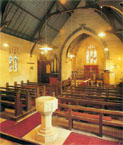Beijing holds secret talks with leaders of banned churches
 Beijing, Jan. 26 : Chinese officials and leaders of the banned Protestant Church appear to be on the reconciliation path after several decades.
Beijing, Jan. 26 : Chinese officials and leaders of the banned Protestant Church appear to be on the reconciliation path after several decades.
According to The Times, they have had their first meeting in an office in Beijing.
The timing of the meeting is being termed as significant, as this year is the 60th anniversary of Communist power and the Chinese Government is keen to avoid disturbances to mar its celebrations.
The Year of the Ox also begins today and Beijing is anxious to usher in a year of stability despite economic difficulties.
For three decades China has allowed officially sanctioned churches to operate within strict limits. Protestants are supposed to worship under the aegis of the official religious body, the Three-Self Patriotic Movement - standing for self-governing, self-teaching and self-supporting. Catholics can worship in churches run by the Chinese Patriotic Catholic Association. Other Christian organisations are illegal.
Officials privately estimate that there are 130 million Christians in China and most are Protestants and affiliated with unofficial house churches. In comparison, there are only
74 million Chinese. The official Church puts the number of Protestants at about 21 million and Catholics at about five million. That means more than 100 million Christians are worshipping independently.
Church leaders believe the State Council Development Research Centre, an official party think-tank, is behind the two breakthrough meetings that were held late last year. The first involved about a dozen academics and lawyers, many known to be members of the unofficial Church. The second brought together six house church leaders.
"The Government is anxious to work out the way to go forward. They have understood that the Protestant Church is not an opposition force but a force for stability and harmony. The Government wanted to discuss the position of house churches and to evaluate whether they posed a threat to the regime. They also wanted to know why the house churches could not accept the leadership of the official body. They wanted to know our requirements when it comes to setting future policy," the paper quoted Pastor Ezra Jin of the Zion Church, as saying.
No representatives of the underground Catholic Church were invited - the Vatican is still viewed by the Communist Party as a rival force and tentative talks yielded little progress. (ANI)